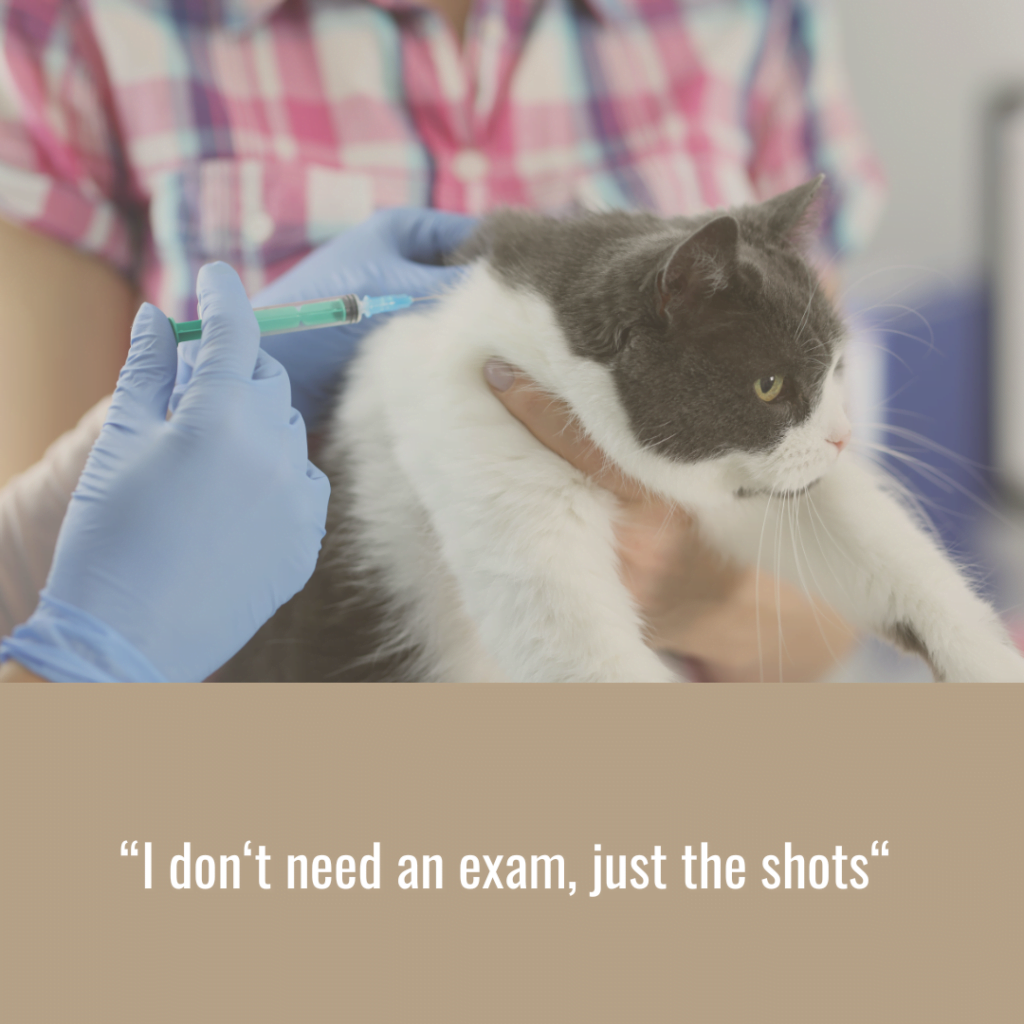Pet owners often call in and tell their veterinary teams that their pet doesn’t need an exam; they just want the “shots.” It’s great that these owners are seeking preventive care for their pets! However, there is often tension when they aren’t given an easy “yes” and are instead told they need to book a consultation with a veterinarian.

Firstly, it’s important to clarify that pet owners tend to use the term “exam” when what their clinic requires is a “consultation.” A consultation is a discussion between the veterinarian and the pet owner. Often, this will include an external examination of the patient – but not always.
In the case of annual vaccinations, a consultation is required even if the clinic just saw the animal for an ear infection a couple of months prior, or even if the pet is perceived to be “healthy” by the owner.
This is because, during these vaccine appointments, the veterinarian is responsible for much more than just administering the vaccines. The purpose of these consultations is to determine the specific needs of the animal and make a tailored plan accordingly. When you go to a veterinary hospital for “routine” or “preventive care,” it is not one-size-fits-all, and there is a lot of responsibility on the veterinary team.
During the consultation, the veterinarian will discuss with you, the pet owner, the lifestyle of your pet and any risk factors to their health. This is to ensure that you can maximize the time you have with your furry family member and that we aren’t putting them at risk by omitting certain preventive measures or by giving them something that may make them ill.
This is very different from a vaccine clinic, where there is no consultation with between pet owner and veterinarian. The only job of the veterinary team at these clinics is to administer vaccines. The public does not hold these clinics accountable for the overall health of their pets, simply the delivery of that one product. This may be better suited to some families, which is totally okay! But it’s important to recognize the difference in expectations from these pop-up clinics vs a regular hospital.
At the veterinary hospital, the teams are responsible for the overall health of their patients. If a dog were to become lethargic shortly after their vaccinations at a hospital, the veterinary team would be held accountable for the outcome. This accountability means that they must be thorough in their discussions with owners and treatment plans to ensure that the vaccine is appropriate and safe for the pet at that time.
Additionally, these appointments provide an opportunity to discuss other preventive measures pet owners can take to ensure their beloved animals stay healthy for many years to come. It’s a chance to review options for parasite prevention tailored to your pet’s lifestyle and family environment, helping to prevent diseases effectively. Depending on your pet’s age, bloodwork might also be recommended as an “internal examination” to catch potential health issues early, before they become more serious.
Veterinary consultations ensure that vaccinations and other preventive measures are administered safely and effectively, tailored to each pet’s unique needs. These consultations are not just a formality but a critical part of your pet’s healthcare. By discussing your pet’s lifestyle, health status, and potential risk factors, veterinarians can make informed decisions that contribute to the long-term well-being of your pet.
Remember, the goal of your veterinary team is to keep your pet healthy and happy for as long as possible. Through these consultations, they can provide the best care possible, addressing any concerns and preventing potential health issues before they arise. So, the next time you schedule your pet’s vaccinations, understand that the consultation is a vital step in ensuring a long, happy life with your beloved pet.
